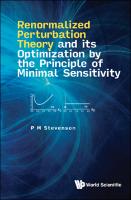Renormalized Perturbation Theory And Its Optimization By The Principle Of Minimal Sensitivity
Abstract
The results of renormalized perturbation theory, in QCD and other quantum field theories, are ambiguous at any finite order, due to renormalization-scheme dependence. The perturbative results depend upon extraneous scheme variables, including the renormalization scale, that the exact result cannot depend on. Such 'non-invariant approximations' occur in many other areas of physics, too. The sensible strategy is to find where the approximant is stationary under small variations of the extraneous variables. This general principle is explained and illustrated with various examples. Also dimensional transmutation, RG equations, the essence of renormalization and the origin of its ambiguities are explained in simple terms, assuming little or no background in quantum field theory. The minimal-sensitivity approach leads to 'optimized perturbation theory,' which is developed in detail. Applications to Re⁺e⁻, the infrared limit, and to the optimization of factorized quantities, are also discussed thoroughly.
Keywords
Physics;Particle Physics / High Energy Physics / Quantum FieldsDOI
10.1142/12817ISBN
9789811255687, 9789811255700, 9789811255694Publisher
World Scientific Publishing CompanyPublisher website
https://www.worldscientific.com/Publication date and place
Singapore, 2022Imprint
World ScientificClassification
Cosmology and the universe


 Download
Download